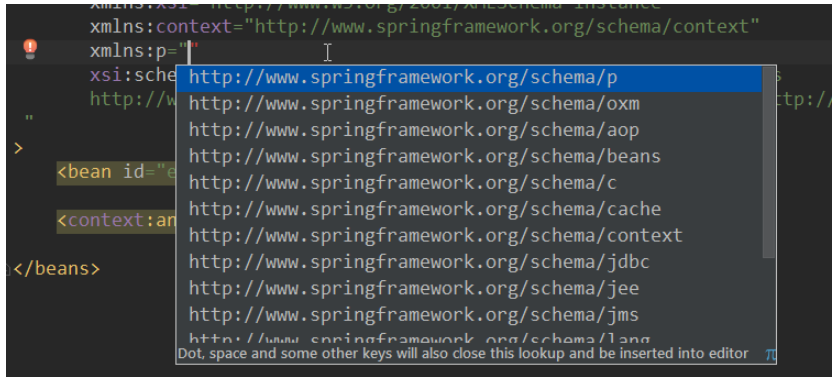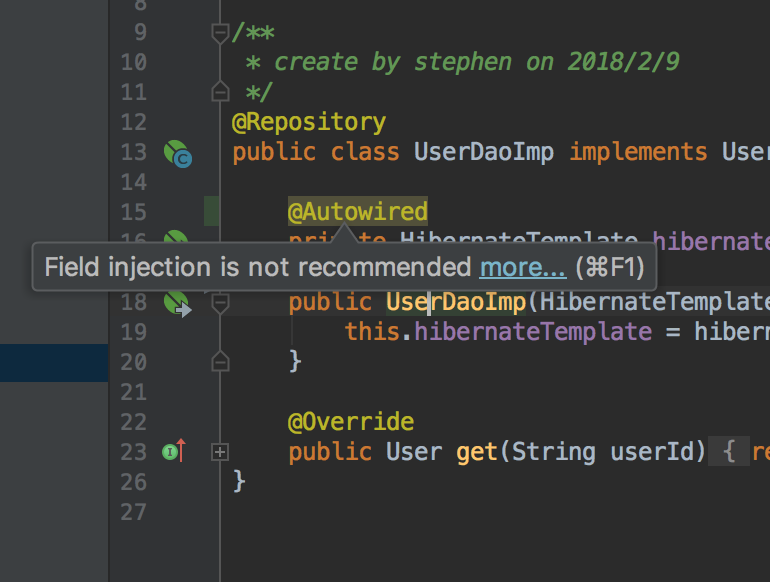这篇文章主要介绍“IDEA中怎么引入spring的命名空间”,在日常操作中,相信很多人在IDEA中怎么引入spring的命名空间问题上存在疑惑,小编查阅了各式资料,整理出简单好用的操作方法,希望对大家解答”IDEA中怎么引入spring的命名空间”的疑惑有所帮助!接下来,请跟着小编一起来学习吧!
我们在写spring的配置文件的时候,有的时候可能会用到 P 标签,然后我们发现自己并没有p标签啊,那么我们一起来看我是怎么解决的。
首先在我们的xml文件的首部添上这句话:
xmlns:context="http://www.springframework.org/schema/context"
然后我们打出
xmlns:p=
然后就会相应的提示:

还有一点需要注意的就是:
需要注意的是必须在xmlns:context="”这一行的下面打,否则也不会提示,如图所示位置即可提示,否则可能不提示
最终的代码:
xmlns="http://www.springframework.org/schema/beans" xmlns:xsi="http://www.w3.org/2001/XMLSchema-instance" xmlns:util="http://www.springframework.org/schema/util" xmlns:context="http://www.springframework.org/schema/context" xmlns:p="http://www.springframework.org/schema/p" xsi:schemaLocation="http://www.springframework.org/schema/beans http://www.springframework.org/schema/beans/spring-beans.xsd http://www.springframework.org/schema/util http://www.springframework.org/schema/util/spring-util.xsd">
1.添加spring的依赖包
idea可以直接右击项目 选择add frame support,勾选spring即可
2.创建applicationContext.xml
在src的直接子目录下创建 applicationContext.xml
这里给出一个applicationContext.xml 的实例,以及注释解释
<?xml version="1.0" encoding="UTF-8"?> <beans xmlns:xsi="http://www.w3.org/2001/XMLSchema-instance" xmlns="http://www.springframework.org/schema/beans" xmlns:aop="http://www.springframework.org/schema/aop" xmlns:context="http://www.springframework.org/schema/context" xmlns:tx="http://www.springframework.org/schema/tx" xsi:schemaLocation="http://www.springframework.org/schema/beans http://www.springframework.org/schema/beans/spring-beans.xsd http://www.springframework.org/schema/aop http://www.springframework.org/schema/aop/spring-aop.xsd http://www.springframework.org/schema/context http://www.springframework.org/schema/context/spring-context.xsd http://www.springframework.org/schema/tx http://www.springframework.org/schema/tx/spring-tx.xsd"> <!-- 扫描有注解的文件 base-package 包路径 --> <context:component-scan base-package="service.imp, action, dao.imp"/> <!-- 定义 Autowired 自动注入 bean --> <bean class="org.springframework.beans.factory.annotation.AutowiredAnnotationBeanPostProcessor"/> <!-- 声明式容器事务管理 ,transaction-manager指定事务管理器为transactionManager --> <bean id="transactionManager" class="org.springframework.orm.hibernate5.HibernateTransactionManager"> <property name="sessionFactory" ref="sessionFactory"/> </bean> <tx:advice id="txAdvice" transaction-manager="transactionManager"> <tx:attributes> <tx:method name="*User"/> <tx:method name="*" propagation="NOT_SUPPORTED" read-only="true"/> </tx:attributes> </tx:advice> <!-- 定义切面,在service包及子包中所有方法中,执行有关的hibernate session的事务操作 --> <aop:config> <!-- 只对业务逻辑层实施事务 --> <aop:pointcut id="serviceOperation" expression="execution( * service..*.*(..))"/> <aop:advisor advice-ref="txAdvice" pointcut-ref="serviceOperation"/> </aop:config> <!-- 配置dataSource --> <bean id="dataSource" class="com.mchange.v2.c3p0.ComboPooledDataSource"> <property name="driverClass" value="com.mysql.jdbc.Driver"/> <property name="jdbcUrl" value="jdbc:mysql://localhost:3306/j2ee?useUnicode=true&characterEncoding=utf-8&autoReconnect=true"/> <property name="user" value="root"/> <property name="password" value="wyy"/> <property name="initialPoolSize" value="5"/> <property name="maxPoolSize" value="10"/> </bean> <!-- 配置sessionFactory --> <bean id="sessionFactory" class="org.springframework.orm.hibernate5.LocalSessionFactoryBean"> <property name="dataSource" ref="dataSource"/> <property name="packagesToScan" value="model"/> <property name="hibernateProperties"> <props> <prop key="hibernate.dialect"> org.hibernate.dialect.MySQL57Dialect</prop> <prop key="hibernate.show_sql">false</prop> <prop key="hibernate.format_sql">true</prop> <prop key="hibernate.hbm2ddl.auto">update</prop> <prop key="hibernate.connection.autocommit">true</prop> </props> </property> </bean> <!-- 配置hibernateTemplate --> <bean id="hibernateTemplate" class="org.springframework.orm.hibernate5.HibernateTemplate"> <property name="sessionFactory" ref="sessionFactory"/> </bean> </beans>
3.给service的实现类添加@Service注解 给dao的实现类添加@Repository注解 将生命周期管理交给spring
注意所有交给spring管理的类,不能new出实例,只能用spring注入。
4.所有使用到service和dao的地方,均使用@Autowired注解注入。
@Autowired注解可以在构造函数、类成员属性、getset方法添加注解注入bean,但是类成员属性的注入方法是不推荐的

总结下来,使用属性注入会产生如下问题
对象和注入的容器有着很紧的耦合
对象间的耦合被隐藏了,外部无法看到,不利于复杂度控制
如果没有注入容器,对象无法创建
当一个类有多个属性注入,你感知不到他的复杂度。而当你使用构造函数注入时,就会发现,要穿入的参数过多。也是不利于复杂度控制
5.dao的实现技术
sessionFactory
@Repository
public class UserDaoImp implements UserDao {
private SessionFactory sessionFactory;
@Autowired
public UserDaoImp(SessionFactory sessionFactory) {
this.sessionFactory = sessionFactory;
}
@Override
public User get(String userId) {
return sessionFactory.openSession().load(User.class, userId);
}
}hibernateTemplate
@Repository
public class UserDaoImp implements UserDao {
@Autowired
private HibernateTemplate hibernateTemplate;
public UserDaoImp(HibernateTemplate hibernateTemplate) {
this.hibernateTemplate = hibernateTemplate;
}
@Override
public User get(String userId) {
return hibernateTemplate.get(User.class, userId);
}
}hibernateTemplate封装了SessionFactory,数据库操作变得更简单。
如下给出实现hibernateTemplate分页的代码。
@Override
public List<Order> getListByHql(String hql, int page, int pageSize) {
return hibernateTemplate.execute(new HibernateCallback<List<Order>>() {
@Override
public List<Order> doInHibernate(Session session) throws HibernateException {
Query<Order> query = session.createQuery(hql);
query.setFirstResult((page - 1) * pageSize).setMaxResults(pageSize);
//把结果返回
return query.list();
}
});
}nested exception is java.lang.NoClassDefFoundError: org/aspectj/weaver/reflect/ReflectionWorld$ReflectionWorldException
这个错误显然是没有找到某个jar包。如果要定义aop,除了spring核心包之外,还需要自行下载这两个jar。
aopalliance.jar
aspectjweaver.jar
检查一下jar包,发现没有aspectjweaver.jar,下载并加入到项目路径即可。
到此,关于“IDEA中怎么引入spring的命名空间”的学习就结束了,希望能够解决大家的疑惑。理论与实践的搭配能更好的帮助大家学习,快去试试吧!若想继续学习更多相关知识,请继续关注亿速云网站,小编会继续努力为大家带来更多实用的文章!
免责声明:本站发布的内容(图片、视频和文字)以原创、转载和分享为主,文章观点不代表本网站立场,如果涉及侵权请联系站长邮箱:is@yisu.com进行举报,并提供相关证据,一经查实,将立刻删除涉嫌侵权内容。